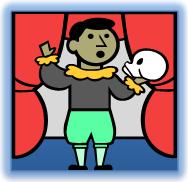The auxiliary verb "sein" in German

Meaning
"Sein" means "to be" and is a very important verb in German, given that it is one of the three auxiliary verbs (Hilfsverben) together with haben and werden that exist in German.
Auxiliary Verb
"Sein" is used together with haben as an auxiliary verb. Its tenses:
- Futur II
Er wird wohl im Urlaub gewesen sein
He probably is on vacation - Perfekt
Sie ist am Montag gekommen
She came on Monday - Plusquamperfekt
Sie hat gedacht er war schon angekommen
She thought that he had arrived already
Visit this link if you want to know when to use sein as an auxiliary.
"Sein" also is used as an auxiliary in one type of passive, Das Zustandspassiv
Das Spiel ist gewonnen
The game is won
Copulative Verb
The verb "sein" together with the verbs bleiben and werden are copulative. This means that clauses are formed with two nominatives:
Er ist ein Herr
He is a master
"Er" and "ein Herr" are declined in the nominative.
The Conjugation of the verb "sein"
Sein is irregular which is why its conjugation must be learned.
| Verb | 3rd Person | Präteritum | Partizip II | Meaning |
|---|---|---|---|---|
| sein | ist | war | gewesen | to be |
Present simple (Präsens Indikativ)
| Conjugation | Meaning |
|---|---|
| ich bin | I am |
| du bist | you are |
| er ist sie ist es ist | he is she is it is |
| wir sind | we are |
| ihr seid | you are |
| sie sind | they are |
Examples:
Ich bin elf Jahre alt
I am eleven years old
Wie ist dein Name?
What is your name?
Ich bin Frank
I am Frank
Was sind Sie von Beruf?
What’s your profession?
Ich bin Kellnerin
I’m a waitress
Es ist zwei Uhr
It’s two o’clock
Wir sind zufrieden
We are content
Es kann nicht sein
It can’t be
More information about Present tense.
Subjunctive I (Konjunktiv I)
The Konjunktiv I is used for indirect speech.
| Conjugation |
|---|
| ich sei |
| du seist du seiest |
| er sei sie sei es sei |
| wir seien |
| ihr seiet |
| sie seien |
Martina sagt, sie sei schwanger
Martina says that she’s pregnant
Präteritum
| Conjugation | Meaning |
|---|---|
| ich war | I was |
| du warst | you were |
| er war sie war es war | he was she was it was |
| wir waren | we were |
| ihr wart | you were |
| sie waren | they were |
Maria war Lehrerin
Maria was a teacher
More information about Präteritum
Konjunktiv II
| Conjugation |
|---|
| ich wäre |
| du wärst du wärest |
| er/sie/es wäre |
| wir wären |
| ihr wärt ihr wäret |
| sie wären |
Ich wäre froh, wenn ich eine Wohnung hätte
I would be happy if I had an apartment
More information about Konjunktiv II
Imperative (Imperativ)
| Imperativ | Meaning | |
|---|---|---|
| 2nd Person Singular | sei | be |
| 2nd Person Plural | seid | be |
More information about imperative
Participle
| Participle | Conjugation |
|---|---|
| Partizip I | seiend (being) |
| Partizip II | gewesen (been) |
More information about Partizip
Auxiliary verb (Hilfsverb)
| sein |
Construction: "Sein" + "zu"
Construction "sein + zu" has the meaning of "to have to" and its behavior is similar to that of a modal verb.
Was ist zu tun?
What is to be done?
Audiovisual Suplement
To conclude: A beautiful song from the Disney movie Anastasia “Once upon December”
Next Lessons:
home > : Pronouns | Prepositions | Nouns | Plurals | Diminutives | Conjugation | Passive | Irregular verbs | Modal Verbs | Separable verbs | Reflexive verbs | Reciprocal verbs | Impersonal verbs | Conjunctions | Articles | Adverbs | Konjunktionaladverbien | Adjective | Comparative and superlative | Word order in German | Negation and Affirmation | Interrogation | Indirect question | Subordinates | relative clauses | Conditional clauses | Comma
Suggestions to Help You | Difficulties with learning German | Greetings